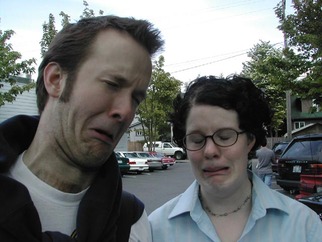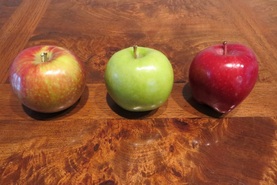|
Six years ago, I heard an advertisement on the radio. The announcer was describing a new cell phone: “It’s just not stylish…” Not stylish? Why would anyone want to buy a phone that's not stylish? Further thought made me decide they had misplaced their modifier, not their minds—their limiting modifier. I was pretty sure that what the company had been aiming for was something more like this: It’s not just stylish… it’s functional, it’s practical, it’s state-of-the-art… Why is it important to pay attention to limiting modifiers, a small class of little words? Because, as you can see, they can make big difference to your meaning. Limiting modifiers limit the scope of what they modify. Some of the most common are just, only, almost, and nearly. Readers will automatically assume that what is being limited is the item occuring immediately after the modifier. Limiting modifiers are, in some ways, more flexible than other modifiers, as they can occur in many different places in a sentence, modifying a noun or a verb—but the change in location signals a change in meaning:
So, misplace your keys, your Mighty Mouse stapler, your to-do list, but never your modifiers. It’s just not stylish. How do you feel about limiting modifiers? Are they friend or foe? Have you any good examples to share?
3 Comments
Writing a novel consists of writing a series of individual yet connected scenes. The writer has to focus on the scene at hand, while remembering to consider how that scene fits within the story as a whole.
Sarah Domet (90 Days to Your Novel) puts it this way: "...the writer must master the art of gazing outward and downward, a bit like a quarterback, who is constantly looking both at his immediate surroundings, peripherally, so that he doesn't get sacked by the defense, while his eyes are focused downfield for the pass. You, too, must always keep your eyes in two places at once: the micro (the scene) and the macro (the novel). It is essential to constantly consider how each of the "parts" of your novel influences the overall trajectory of your plot and character development." "I try to pull the language in to such a sharpness that it jumps off the page. It must look easy, but it takes me forever to get it to look so easy… it takes me forever to get it to sing. I work at the language."  Many of us, in our excitement to hold in our hands the sweet fruits of our labor, try to rush the writing process. We want to eat the fruit before it’s ripe. That can be an unpleasant experience—for us and for our readers. Copy editing is an important step in bringing your book to maturity, in making it not just palatable, but satisfying. But copy editing may not be the next step for you. Copy editing should be done after developmental editing, not before. If you’ve not yet spent enough time on the global issues, such as character development and pacing, it’s not time to move on to a copy edit. Why spend time musing over correct word choice and accurate comma placement in a paragraph that may be deleted? Or fixing fragments in a chapter that will be totally revised as you turn pages of lifeless background information into living scenes? (Not a fiction writer? Don’t gloat; there are things for you to watch out for too.) Before you submit your work to a copy editor, focus on the big picture. There is a lot that could be said about this, but for now consider these steps:
· Okay, now you may be ready for a copy edit. Writing is hard work. But the more you write and the more you focus on improving your writing, the easier it becomes. When you learn early on in your writing life to edit out info-dumping and head hopping (and more), you’ll likely not include them in your next novel. Well, maybe in the first draft, but likely not in the second or third draft. The better your writing becomes, the more satisfied (and more plentiful?) your readers will be. The more satisfied your readers become, the happier you will be. · Have you ever tried to eat the fruit before it was ripe? Or tried sharing it with others while it was still sour? What happened?
· What can you tell us about your experiences with the order of editing that can help the rest of us? It used to be easy to pick a type of apple. We didn’t have as many choices as we do today. I only remember four from my childhood. Do you recognize these three? If you couldn’t remember their names, could you at least match them to these tags: Red Delicious, McIntosh, and Granny Smith? Not too hard, right? So let’s make it a little more challenging. Can you identify the following? If I give you their names, can you match them up? Gala, Pink Lady, McIntosh, Jonagold, and Fuji.
If you’re a pomologist, or even just an apple lover, you might have identified them all, but most of us haven’t a clue. Even most grocery clerks can’t tell the difference even though the fruit may roll across their conveyor belts on a regular basis. That’s why stores put those little tags on fruit. Names aside, can you tell which will work best for your “audience” and your purpose? Which would you serve to someone who likes their apples crisp and sweet? To one who likes an apple to be tart? Which are best eaten raw? Which are best for baking? Copy editors, like pomologists, have a specialty; it’s language. Good copy editors not only can put a name to constructions like dangling modifiers and parallel structures, they can tell which forms and which words are best for your topic, your genre, and your intended audience. Copy editors know when you want “affect,” instead of “effect.” They know that a business document should be more concise than a memoir would likely be. (Dangling modifiers, by the way, are those rotten apples in the barrel; just throw them out so they don’t spoil the rest.) What do you think of this comparison? Can you see how a copy editor might help you with your writing, whether fiction or nonfiction? I am so excited to begin this blog and this journey. I have so many things to share with you: about writing, about editing, and about language. This initial post, though, will just be to say hello. Welcome to my website. Please take a look around. And, as always, feel free to comment or ask questions.
|
Lisa RoettgerLisa is a developmental editor and a copy editor, as well as being a writer herself. She loves helping writers bring their books into the hands, heads, and hearts of readers. ArchivesCategories
All
|
Photo used under Creative Commons from goldberg



 RSS Feed
RSS Feed
